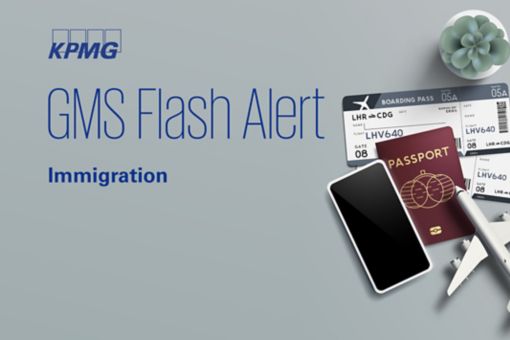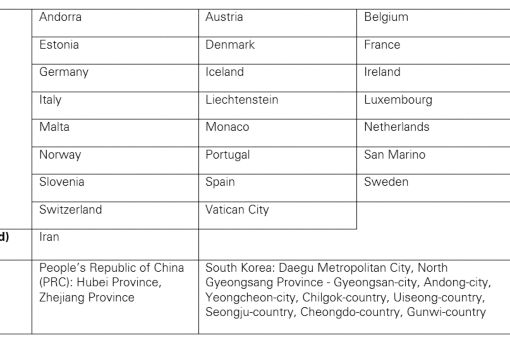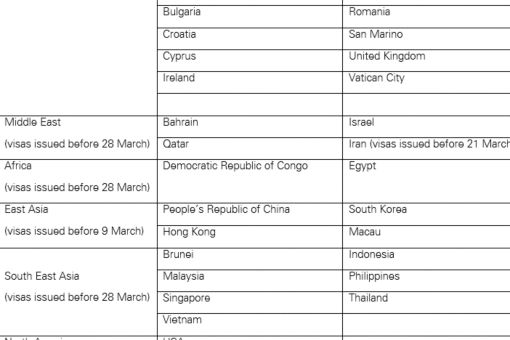Japan – Updated Travel/Immigration Measures to Combat Coronavirus (COVID-19)
Japan–Updated Travel/Immigration Measures Re: COVID-19
In addition to the existing immigration restrictions in place due to the rapid spread of the coronavirus (COVID-19), the Japanese government announced updated measures on 26 March 2020. Effective from 27 March those who fall under any of the categories noted in the tables in this GMS Flash Alert are not permitted to land in Japan unless there are exceptional circumstances. Japanese nationals are exempt from being denied entry – though there are special rules that apply in respect of their entry. Plus, there are new policies in Tokyo, where the governor warns the capital has entered a critical phase in the fight against COVID-1.

In addition to the existing immigration restrictions in place due to the rapid spread of the coronavirus (COVID-19), the Japanese government announced updated measures on 26 March 2020.1 The measures are the broadest set of border controls that Japan has implemented so far since the outbreak of COVID-19. (For prior coverage, see GMS Flash Alert 2020-090, 21 March 2020.)
The government has also been urging people to make sure they take preventive measures to avoid infections and pay attention to the latest information on the situation in their areas, while bearing in mind the possibility of further spread of infections and strengthening of controls by the government on movement.
WHY THIS MATTERS
The expanded travel restrictions and the interruption to visa services, including application processing and visa issuance for many people, will mean they cannot travel to or take up work assignments in Japan – bringing potentially a great deal of inconvenience, anxiety, and frustration. Due to the imposed travel restrictions, the Japanese embassies/consulates in the listed countries or regions strongly advise waiting for visa applications until further notice.
Whereas previously, if one’s CoE (Certificate of Eligibility) was about to expire before the end of April, one could raise this matter immediately with the competent embassy/consulate and ask for the issuance of a letter to be officially granted for a six-month period of validity for the CoE, now CoE applications already filed will be suspended for many individuals from the listed categories.
Please note that the government may change the travel restrictions without advance notice. Due to the fluid situation, any unnecessary travels not just from abroad, but also within the country, might be restricted unexpectedly.
Lack of awareness and/or any false declaration may cause penalties including imprisonment, imposition of fines, revocation of residence status, as well as deportation from Japan.
Context Tokyo and Metropolitan Area
The Tokyo governor warns the capital has entered a critical phase in the fight against COVID-19 following the recent rise in the number of confirmed cases. The residents of Tokyo are urged to refrain from unnecessary outings until 12 April.2 The period might be extended and/or forced into a “lockdown” if the situation gets more severe. The governors in other prefectures including the greater Tokyo metropolitan area also urged residents to avoid all unnecessary travel to the capital to stave off the explosion of infection in the densely populated area. The measures apply to all residents in Japan as well as temporary visitors from abroad.
The local governments announce on a daily basis information related to COVID-19 in several languages. The Tokyo Metropolitan government provides the following supports for foreign nationals:3
- Consultation and database services installed via LINE are available 24 hours a day in several languages. This provides a proper approach for individuals to take by simply inputting basic information and a health check-up. The “chatbot” will also regularly check the users’ health condition and raise an alert when necessary to contact the COVID-19 Call Center.
- The COVID-19 Call Center (0570-550-571) is available from 09:00 – 21:00 including weekends and holidays. The following languages are available: English, Chinese, and Korean.
Denied Entry (Updated)
Effective from 27 March at 0:00 (JST), those who fall under any of the categories below are not permitted to land in Japan unless there are exceptional circumstances. Japanese nationals are exempt from being denied entry. They are however required to take polymerase chain reaction (PSR) tests in Japan upon their return at the airport and are strictly required to be self-quarantining for 14-days. (See “Enhanced Quarantine”.)
1. Foreign nationals who have been physically present within the countries or regions listed below in the 14 days prior to their arrival to Japan.

1. Foreign nationals who hold a PRC passport issued in the Hubei Province or in the Zhejiang Province.
2. Foreign nationals who are on board a passenger ship sailing for the purpose of entering Japanese ports and who carry a risk of being infected by COVID-19.
KPMG NOTE
- CoE applications already filed by those who fall under the categories not permitted to land in Japan will be suspended and new applications will not be accepted until further notice.
- Visa applications from those who fall into the categories not permitted to land in Japan will not be accepted. Visa applicants are required to fill in and submit a questionnaire about whether or not they have (or will have) travelled to the areas listed in Category A above within the 14 days before arriving in Japan.
- Those foreign nationals who hold valid entry visas for Japan (whether short/long or single/multiple-entry) will not be considered an exception to the refusal of entry.
Enhanced Quarantine (Updated)
Effective from 28 March at 0:00 (JST), all travelers including Japanese nationals entering from the list below are required to self-quarantine at their home or place of accommodation (e.g., hotel) for 14 days after entering Japan. They are strictly asked to refrain from using public transportation upon arrival. Before arriving, the travelers should secure accommodations in Japan where they are able to stay for 14 days and private transportation from the airport to the destination.

KPMG NOTE
- The validity of visas issued before the date in brackets by Embassies or Consulates General of Japan in the noted countries will be temporarily suspended (whether short/long or single/multiple-entry) until further notice.
- All visa exemption arrangements and visa waiver registration arrangements will be temporarily suspended for holders of passports of all countries listed including holders of Hong Kong SAR, British National Overseas with right of residence in Hong Kong, and Macau SAR. The suspensions will apply until the end of April 2020. The period of suspension can be renewed.
- The validity of re-clearance granted to holders of APEC Business Travel Cards issued by China (including Hong Kong), South Korea, Indonesia, Singapore, Thailand, Philippines, Vietnam, and Malaysia will be temporarily suspended. The suspensions will apply until the end of April 2020. The period of suspension can be renewed.
- All passenger flights arriving from the PRC and South Korea will only be permitted to land at Narita International Airport and Kansai International Airport.
The information provided in this article will be updated periodically when there are new announcements from the Japanese government.
Our office is tracking these matters closely. We will endeavor to keep readers of GMS Flash Alert posted on any important developments as and when they occur.
FOOTNOTES
1 See the Prime Minister’s Office of Japan website.
2 See J. McCurry, H. Davidson, and L. Kuo, “Tokyo and Hong Kong brace amid fears of fresh wave of coronavirus cases,” The Guardian (online), 26 March 2020 . (Note that this is a 3rd party (non-governmental, non-KPMG) website. Providing this link does not represent an endorsement of this website by KPMG.)
3 See Regarding refusal of landing to prevent the spread of COVID-19 disease document at Ministry of Justice website.
RELATED LINKS
* Please note the KPMG International member firm in the United States does not provide immigration or labour law services. However, KPMG Law LLP in Canada can assist clients with U.S. immigration matters.
The information contained in this newsletter was submitted by the KPMG International member firm in Japan.
SUBSCRIBE
To subscribe to GMS Flash Alert, fill out the subscription form.
© 2024 KPMG Tax Corporation, a tax corporation incorporated under the Japanese CPTA Law and a member firm of the KPMG network of independent member firms affiliated with KPMG International Cooperative (“KPMG International”), a Swiss entity. All rights reserved.
GMS Flash Alert is a Global Mobility Services publication of the KPMG LLP Washington National Tax practice. The KPMG name and logo are trademarks used under license by the independent member firms of the KPMG global organization. KPMG International Limited is a private English company limited by guarantee and does not provide services to clients. No member firm has any authority to obligate or bind KPMG International or any other member firm vis-à-vis third parties, nor does KPMG International have any such authority to obligate or bind any member firm. The information contained herein is of a general nature and is not intended to address the circumstances of any particular individual or entity. Although we endeavor to provide accurate and timely information, there can be no guarantee that such information is accurate as of the date it is received or that it will continue to be accurate in the future. No one should act on such information without appropriate professional advice after a thorough examination of the particular situation.
